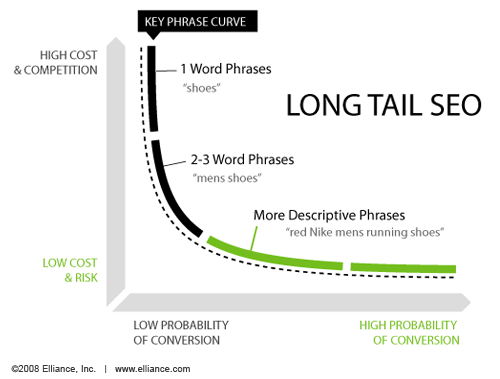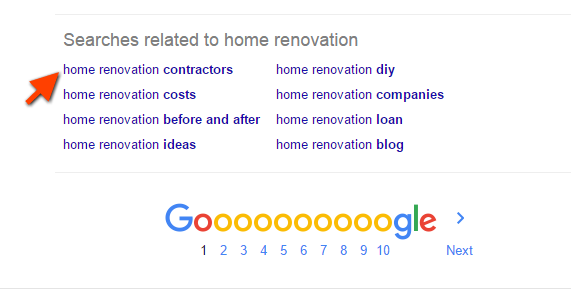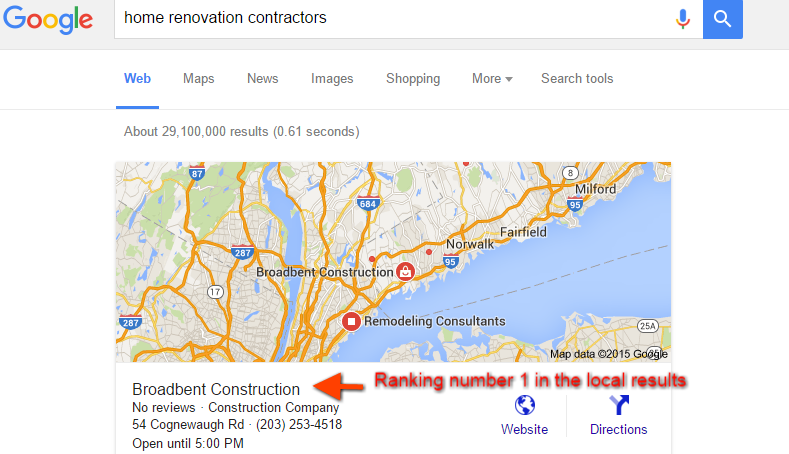What is a Long-tail keyword phrase?
“Long-tail keywords” are a string of three or more words that make up a phrase which are very specific to your products or to what you are selling. Whenever a customer uses a highly specific search phrase, they tend to be much closer to the “ready to buy” phase and are actually are looking to purchase something. In most cases, studies have shown that the less specific and shorter a keyword search is, the more likely a person is in the research phase, and not ready to make a buying decision.
According to Google’s Digital Marketing Evangelist, Avinash Kaushik’s latest blog post, it is important to understand that, from an SEO standpoint, people usually type in more than just one or two words when searching for a product or information online. “Let’s not forget that proportionally there are very few head searches, your long tail searches will be huge. Oh, and remember that no one types a word or two, people use longer phrases“. – Avinash Kaushik

Search engine algorithms’ are getting more complex and are always changing.
This description explains indexing, “ When a website gets crawled by search engines, the search engines use automated software programs known as bots or spiders to survey the web and build their databases. Web documents are retrieved by these programs and analyzed. Data collected from each web page are added to the search engine index. When you enter a search query at a search engine site, your input is checked against the search engine’s index of all the web pages it has analyzed. The best urls are then returned to you as hits, ranked in order with the best results at the top. The most common form is a text search on the web. Most search engines do their text query and retrieval using keywords.” -Monash.com
All indexable words within a page, are used by Google bots to display the most relevant search results. Of course, the repetition, relevance and placement of words are some of the biggest factors that search engines use.
Another difference worth noting between short and long tail keyword phrases are the search results. If you were to search the keyword “renovation” in Google, you will receive 109,000,000 results. Then, if you look up the short tail keyword phrase “home renovation” in Google, it returns 18,900,000 results. Finally, if you enter the long tail keyword phrase “home renovation contractors in Greenwich, CT”, it provides 2,100,000 results. Although the long tail keyword phrase is searched less than the shorter keyword phrases, there is much less SERP competition.
Another reason to include multi-keyword phrases into your content, is that they tend to be easier to rank for, compared to generic single and double keyword phrases.
As another example, if you tried to rank for the keyword phrase “home renovation” you will be facing huge competition from big renovation brands like HGTV and the show This Old House. These kinds of brands tend to have more authority, money and a higher domain authority than regular construction companies or businesses. That’s why we are suggesting to our clients, the use of targeting more location specific, longer tail keyword phrases. You can also look at Google’s related searches at the bottom of a page to get ideas. Here is a screenshot of longer tail keyword phrases from Google related to “home renovation”

Using long tail keywords to corner a smaller market has just as much potential, if not more, than using short tail keywords in a larger, more exposed market. Some sites may find that the long tail isn’t quite as useful in their market, while other sites will do far better by targeting the long tail. Either way, using long tail keywords where you can, will definitely give you the advantage over your competitors. We helped one of our clients Broadbent Construction, to dominate the local search market in Greenwich, CT. If you are in the CT area and you typed in the “home renovation contractor” you would see these search results.

Research on recent search trends in the last few months has shown that long-tail searches of 5-plus words used have increased by an average of 7%. Also, 75% of the websites that were studied, saw a decrease in the number of one- and two-word searches. . Since the launch of Google Instant Autocomplete a search enhancement that shows results as you type, most searchers prefer a more refined search. Given this info, it’s a good idea to analyze your website and to ask yourself these questions:
- Is my site optimized enough for Long-tail searches? Will it rank organically as search queries become more and more refined?
- Does my website incorporate a strong link building strategy for mid- to long-tail keywords as anchor text?
- Is my website optimized to allow bots to crawl and index the deep and potentially long-tail keyword pages?




3 Responses
Yes Long-tail keywords are very important. I have all these days relied on single word but , people are trying yo get the information using long keywords, mostly, what is, who is, how is…I really started getting more traffic once i stared using. Thanks and also this is my first visit and have found very valuable information on SEO.
Driver Download
Thanks for commenting and visiting our site.